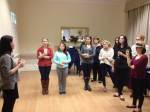FIE wishes to congratulate Ed Gillespie of Futerra (an FIE affiliate). Ed’s proposal to create a website offering ideas for exotic adventures within London has won endorsement from the London Evening Standard’s Ideas for London competition.
Ed’s idea is for Air London which would utilise listings from immigrant communities to offer a flavour of dozens of countries in the capital through concerts, exhibitions and restaurants.Congratulations, on a truly creative and sustainable idea, Ed.
For the original article in the London Evening Standard, please click here.
For more information on Futerra, please click here.



